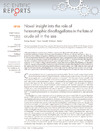Identificador persistente para citar o vincular este elemento:
https://accedacris.ulpgc.es/jspui/handle/10553/75423
| Campo DC | Valor | idioma |
|---|---|---|
| dc.contributor.author | Almeda, Rodrigo | en_US |
| dc.contributor.author | Connelly, T.L | en_US |
| dc.contributor.author | Buskey, E. | en_US |
| dc.date.accessioned | 2020-11-11T14:55:43Z | - |
| dc.date.available | 2020-11-11T14:55:43Z | - |
| dc.date.issued | 2014 | en_US |
| dc.identifier.issn | 2045-2322 | en_US |
| dc.identifier.uri | https://accedacris.ulpgc.es/handle/10553/75423 | - |
| dc.description.abstract | Although planktonic protozoans are likely to interact with dispersed crude oil after a spill, protozoan-mediated processes affecting crude oil pollution in the sea are still not well known. Here, we present the first evidence of ingestion and defecation of physically or chemically dispersed crude oil droplets (1–86 μm in diameter) by heterotrophic dinoflagellates, major components of marine planktonic food webs. At a crude oil concentration commonly found after an oil spill (1 μL L−1), the heterotrophic dinoflagellates Noctiluca scintillans and Gyrodinium spirale grew and ingested ~0.37 μg-oil μg-Cdino−1 d−1, which could represent ~17% to 100% of dispersed oil in surface waters when heterotrophic dinoflagellates are abundant or bloom. Egestion of faecal pellets containing crude oil by heterotrophic dinoflagellates could contribute to the sinking and flux of toxic petroleum hydrocarbons in coastal waters. Our study indicates that crude oil ingestion by heterotrophic dinoflagellates is a noteworthy route by which petroleum enters marine food webs and a previously overlooked biological process influencing the fate of crude oil in the sea after spills. | en_US |
| dc.language | eng | en_US |
| dc.relation.ispartof | Scientific Reports | en_US |
| dc.source | Scientific Reports [EISSN 2045-2322], v. 4, 7560 | en_US |
| dc.subject | 251001 Oceanografía biológica | en_US |
| dc.title | Novel insight into the role of heterotrophic dinoflagellates in the fate of crude oil in the sea | en_US |
| dc.identifier.doi | 10.1038/srep07560 | en_US |
| dc.relation.volume | 4 | en_US |
| dc.investigacion | Ciencias | en_US |
| dc.type2 | Artículo | en_US |
| dc.description.numberofpages | 9 | en_US |
| dc.utils.revision | Sí | en_US |
| dc.identifier.ulpgc | No | en_US |
| dc.contributor.buulpgc | BU-BAS | en_US |
| dc.description.sjr | 2,103 | |
| dc.description.jcr | 5,578 | |
| dc.description.sjrq | Q1 | |
| dc.description.jcrq | Q1 | |
| dc.description.scie | SCIE | |
| item.fulltext | Con texto completo | - |
| item.grantfulltext | open | - |
| crisitem.author.dept | GIR ECOAQUA: Ecofisiología de Organismos Marinos | - |
| crisitem.author.dept | IU de Investigación en Acuicultura Sostenible y Ecosistemas Marinos (IU-Ecoaqua) | - |
| crisitem.author.dept | Departamento de Biología | - |
| crisitem.author.orcid | 0000-0002-0090-112X | - |
| crisitem.author.parentorg | IU de Investigación en Acuicultura Sostenible y Ecosistemas Marinos (IU-Ecoaqua) | - |
| crisitem.author.fullName | Almeda García, Rodrigo | - |
| Colección: | Artículos | |
Citas de WEB OF SCIENCETM
Citations
39
actualizado el 18-ene-2026
Visitas
69
actualizado el 10-ene-2026
Descargas
63
actualizado el 10-ene-2026
Google ScholarTM
Verifica
Altmetric
Comparte
Exporta metadatos
Los elementos en ULPGC accedaCRIS están protegidos por derechos de autor con todos los derechos reservados, a menos que se indique lo contrario.
